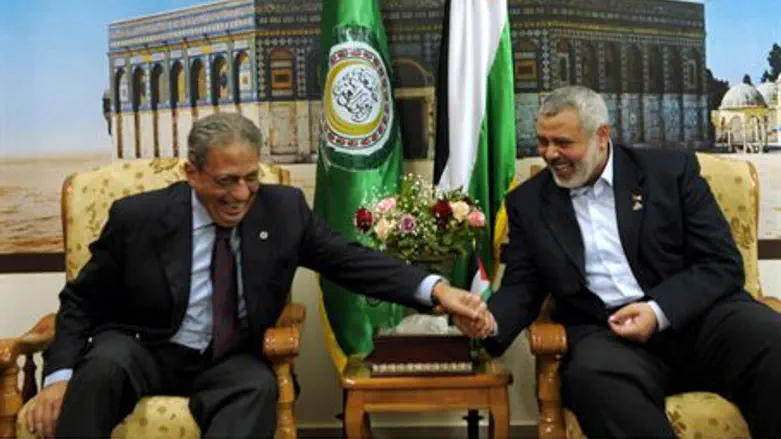
With Presidential elections scheduled in Egypt for four months from now, it appears that former Foreign Minister and current Arab League head Amr Moussa has the inside track.
Amr Moussa's career has been characterized by clashes with - and invective against - Israel and the United States.
The International Peace Institute poll conducted by Charney Research shows that Moussa has the vote of 37% of the electorate – more than twice as much as his nearest competitor, Field Marshall Hussein Tantawi, head of Egypt’s Supreme Military Council. Muslim Brotherhood-backed Muhammad ElBaradei received the support of only 2% of those polled.
Many analysts, looking at Amr Moussa’s past, predict that a President Moussa is likely to continue his anti-Israel approach. Moussa is “a flamboyant demagogue who is sure to try to score points by bashing the United States, the West, and Israel,” writes author Barry Rubin. However, he adds, he believes the West would be advised to prefer “the radical nationalist Moussa, who would be a headache and possibly a disaster, instead of the nominally liberal democratic ElBaradei, who would pave the way for the [Muslim] Brotherhood's growing power and a definite disaster.”
Owes Prominence to His Anti-Israeli Invective
Similarly, Foreign Policy Research Institute associate scholar Eric Trager, who lived in Egypt during the recent revolution, writes, “Moussa owes his startling political ascendance primarily to one thing: his shameless exploitation of anti-Israel demagoguery for political gain.”
It is widely agreed that at the very least, Moussa owes his position as head of the Arab League to his anti-Israel and anti-U.S. approach. When he began to express this more outspokenly than “moderate” President Hosni Mubarak could handle, Mubarak “kicked him upstairs” and made sure he received the Arab League post.
Trager lists several examples of Moussa’s anti-Israel approach: Opposing full Arab normalization with Israel even after the Oslo Accords until after Israel completed giving away all territory; refusing to visit Yad Vashem (though he ultimately compromised); riling Washington by leading a pan-Arab initiative against re-signing the Nuclear Non-Proliferation Treaty (NPT) unless Israel signed it first; backing Yasser Arafat’s refusal to compromise on Jerusalem during and after the failed Camp David summit in the summer of 2000; calling on the Arab world to support the Palestinian Authority intifada; and many more.
Moussa’s popularity remains strong, though some youth activists have attacked him for “not turning out strongly during the events in Gaza, Iraq, Yemen, Libya, and Syria," and for being a member of the original Mubarak government.
“While the fall of Mubarak raises hopes that Egypt will enjoy a post-authoritarian future,” Trager concludes, “the prominence of Moussa threatens to revive Egypt’s anti-Western, Nasser-era past. And, most alarmingly, this is apparently what many Egyptians want.”